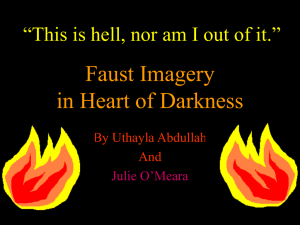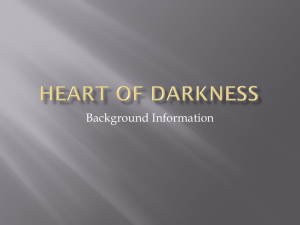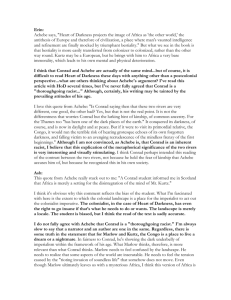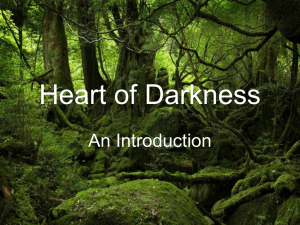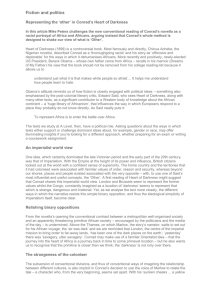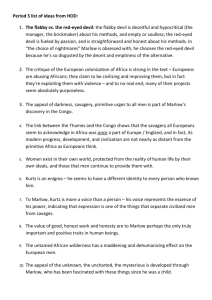Anticipation Guide
advertisement
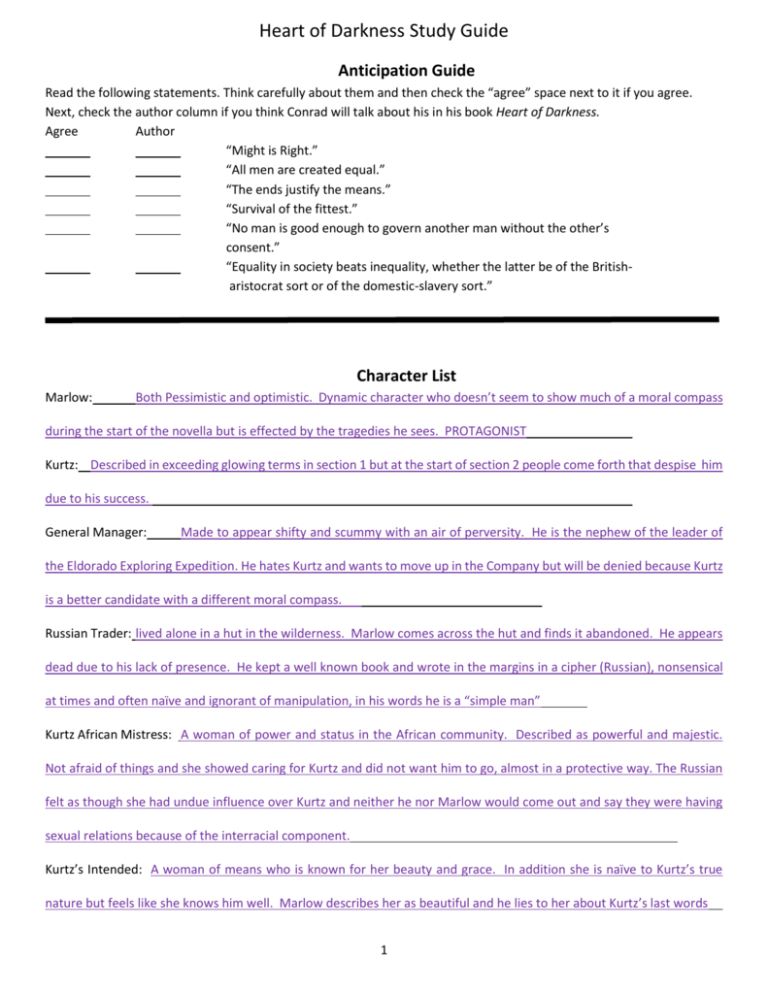
Heart of Darkness Study Guide Anticipation Guide Read the following statements. Think carefully about them and then check the “agree” space next to it if you agree. Next, check the author column if you think Conrad will talk about his in his book Heart of Darkness. Agree Author “Might is Right.” “All men are created equal.” “The ends justify the means.” “Survival of the fittest.” “No man is good enough to govern another man without the other’s consent.” “Equality in society beats inequality, whether the latter be of the Britisharistocrat sort or of the domestic-slavery sort.” Character List Marlow: Both Pessimistic and optimistic. Dynamic character who doesn’t seem to show much of a moral compass during the start of the novella but is effected by the tragedies he sees. PROTAGONIST Kurtz: Described in exceeding glowing terms in section 1 but at the start of section 2 people come forth that despise him due to his success. General Manager: Made to appear shifty and scummy with an air of perversity. He is the nephew of the leader of the Eldorado Exploring Expedition. He hates Kurtz and wants to move up in the Company but will be denied because Kurtz is a better candidate with a different moral compass. Russian Trader: lived alone in a hut in the wilderness. Marlow comes across the hut and finds it abandoned. He appears dead due to his lack of presence. He kept a well known book and wrote in the margins in a cipher (Russian), nonsensical at times and often naïve and ignorant of manipulation, in his words he is a “simple man” Kurtz African Mistress: A woman of power and status in the African community. Described as powerful and majestic. Not afraid of things and she showed caring for Kurtz and did not want him to go, almost in a protective way. The Russian felt as though she had undue influence over Kurtz and neither he nor Marlow would come out and say they were having sexual relations because of the interracial component. Kurtz’s Intended: A woman of means who is known for her beauty and grace. In addition she is naïve to Kurtz’s true nature but feels like she knows him well. Marlow describes her as beautiful and he lies to her about Kurtz’s last words 1 Heart of Darkness Study Guide Marlow’s Aunt: Naïve, helps Marlow get the job with the Company. Marlow paints her as a kind, frivolous female who can’t hold a thought. Section I Questions 1. Conrad structures Heart of Darkness as a frame story. For a writer, what benefits does this structure provide? The structure allows the writer to set the story up and provide the setting with a little more clarity. In the case of Heart of Darkness it also allows Conrad to characterize Marlow after the event. It also provides the audience with a before and after shot while understanding it is a story being told. 2. In the frame story section of the book, what details does Conrad include to create a sense of comfort and peacefulness? What elements contrast the serenity? Conrad includes details of each of the characters on the ship that are listening to Marlow’s story. He also creates a sense of peace by describing the Thames, the sea captain, and the boat. His characterization of the characters shows them reposing on the ship as if they don’t have a care in the world. In contrast he has the characters talking about their dissatisfaction with their lives and the brutality of the Romans and the Europeans in Africa. 3. The unnamed narrator comments that Marlow is “not typical” of seamen. In what ways is he different? He discusses that Marlow is content for a time on land but is typical in the sense that he needs the sea. He is also content not to lead the ship as the captain. He does lust after exploration but he is not a born leader. 4. As Marlow recounts his boyhood experiences, he says that he was like “a silly little bird.” What perceptions do you think this image might have for most readers? Most readers would see Marlow as frivolous and undulating between different opinions. He may make him a little more unreliable or naïve. 5. Marlow notes that he “tried the women” in his attempts to become a steamer captain. In the novel, what is Marlow’s attitude towards this strategy? How do you react to his attitude? He talks about his inability to get a job as a steamer captain so he “tried the women” as a last resort by going to his aunt so she could help him get a job with the company. He sees it as a hopeless plea’ 6. As part of the employment process, Marlow visits an old doctor who works for the company. What measurements does the doctor take and why? How does this meeting affect Marlow? He measures his head and discusses the madness that could exist in his family. The meeting makes Marlow slightly nervous but not enough to make him stop his notion to go to Africa. The doctor makes him question what happens to the people who go to Africa. 7. How does Marlow’s aunt, “the excellent woman,” depict him to the wife of the high dignitary? What problems might this pose for Marlow? Why? He is depicted as a wonderful individual who has a goal to change the “Africans” and make them more civilized. Marlow’s main goal is for adventure and money, her depiction could cause his issues when he goes to meet Kurtz and he does not have the “missionary” feel. Her depiction and her recommendation also could cause his reputation to proceed him in the Congo. 8. How does Marlow describe the African coast (beginning on p. 66)? 2 Heart of Darkness Study Guide He describes with reverence and unknown possibilities with a hint of danger. This should be noted in the double entry travel journals. 9. On occasion, “black fellows” in boats visit the ship that Marlow is aboard. Do you think that the description of these fellows is mostly positive or mostly negative? And, how do these descriptions compare to most depictions of whites in the novel? Described on page 67 of the green book. They are “grotesque masks” and a “wild vitality” as they “glisten with perspiration.” The description is both positive and negative but has a more positive spin with a racist undertone. The whites in the novels are not necessarily described as having such a natural ability to exist and be comfortable instead they are always trying to be something they are not. 10. When he reaches shore, Marlow encounters a chain gang of Africans. What impression does the encounter make on Marlow? He views them as prisoners or “criminals” and he tries to avoid them. At first he is shocked to see them chained together but then he quickly drops that notion and moves to the theory that they are “bad” people. 11. To allow the convicts to proceed up the trail, Marlow steps into a grove of trees. How does his impression of the Africans there compare to his attitude towards the convicts? He views the Africans within the trees with immense pity and concern. He is disgusted at their treatment but is apathetic as well since he does nothing other than offer a dried biscuit to a waning boy. Marlow/Conrad then make a comparison to the discarded machinery when he first arrives and the discarded natives. 12. What impression does the Accountant make on Marlow? How does Marlow’s description of the Accountant contrast with his descriptions of the Africans he has encountered? What effect does this contrast have on readers? He views the accountant as a frivolous, selfish man who doesn’t mind the suffering of others as long as he is profiting. The Accountant is very flamboyant and is meticulously dressed in pure white. The Africans are described as just the opposite, beaten down and abused without any self-worth left. They are also dressed in rags. The reader should make a connection to the unjust situation and the need for a change. The European monopoly and the exploitation of the Africans. 13. How does the Accountant maintain his appearance? What does the Accountant insinuate (or communicate without actually stating it)? He has forced a slave to learn how to properly launder is clothing meticulously. The Account insinuates that civilized people are clean and better than everyone else. He uses his clothes as a power symbol and as a way to proclaim his purity/innocence. 14. What is the Accountant’s attitude towards Kurtz? He is a “very remarkable person” pg. 74 and that he is what everyone should strive to be. All glowing terms of endearment. 15. How does the Accountant’s attitude towards the man who is dying in his hut affect readers’ impressions of him? He comes off as pompous, callous, and crass. There is no pity or conscience to the man and he is very selfish. 3 Heart of Darkness Study Guide 16. What feeling does the Station Manager inspire in Marlow? To Marlow, what seems to be the Station Manager’s best qualification for his job? He inspires disgust and loathing. He does not approve of his perverse treatment of the African slaves and his abuse of power. He seemed to know the right people. 17. During his talk with the Brick maker, Marlow realizes that the man is pumping him for information about Company politics. What aspects of characterization (details, images, diction) does Conrad use to make Marlow’s skepticism believable? Conrad uses the descriptions of the scenery, the diction of the characters, and the descriptions of the character’s facial expressions to help make the skepticism more believable. In addition, the brick maker is also drinking during the conversation. 18. How does the Brick maker characterize Kurtz? How does this characterization compare to what others have said about Kurtz? He describes him as an “emissary of pity” but with a scathing tone. He also views him as strict and known to follow the rules. Kurtz is one of the “gang of virtue” who is coming to “save’ Africa but the brick maker thinks that is a farce. Others have only talked about Kurtz with reverence. 19. On occasion, a night-roaming hippo comes ashore and the pilgrims empty their rifles into it to no effect. What do their actions convey about the pilgrims? What could the hippo symbolize? There is a parallel being made between the hippo and the Africans. There is also a significant portion of Irony in the fact that the pilgrims are there to “help” the people and they should be peaceful pacifists but instead they are brutally attacking a hippo that is not bothering the settlement. Their actions against the hippo transfer to their treatment of the Africans. 20. Perhaps the closest companion Marlow makes at the Central Station is the foreman of the mechanics. Is the foreman a sympathetic character? Why? He is not a sympathetic character but rather he helps to make Marlow content to do nothing as he waits for the rivets. He also dances a jig with him and the foreman is an overall happy man who likes pigeons and keeps his optimism. 21. What is Marlow’s reaction to the arrival of the Eldorado Exploring Expedition? How does Marlow react to the Station Manager’s Uncle? He immediately starts wishing for his rivets again and wants to get out of the settlement. He finds the station manager’s Uncle to be devoid of human emotion and he is planning on exploiting Africa without a thought for the natives or the state of the land. Section II 1. In the conversation between the Station Manager and the Station Manager’s Uncle, what details does Conrad include that create a sense of mystery about Kurtz? Keeps the audience and Marlow guessing about Kurtz’s true motives. They also speak in whispered tones and they do not ever come out and say anything specific about Kurtz but talk in generalities. Also when Conrad describes the scenery he talks about fires and glowing beings. 2. What do the Station Manager and the Station Manager’s Uncle hope will happen to Kurtz? Why do they want to be rid of Kurtz? They hope he dies of natural causes or that “Africa” kills him. They don’t like him because he has moved up in the Company WAY too fast and he is interfering with the nephew’s plans to advance to the top of the company. 4 Heart of Darkness Study Guide 3. Towards the end of their conversation, what affects Marlow so much that he leaps to his feet and startles the two speakers? Marlow leaps to his feet when the Uncle (EEE) and the nephew were describing how Africa was going to kill Kurtz and that it will envelope him in darkness and decay. Marlow freaks out and jumps to his feet with fear over the realization. 4. What causes one of the listeners on the Nellie to say, “Try to be civil…”? Conrad jumps back to the frame story where Marlow is telling the story of Africa to his friends. He is describing his job on the steamer and the role of the Europeans. He also discusses the inner truth and the eerie feeling of someone or something “watching” him at his job just like it watches them at their job. 5. According to Marlow, what for sailors is “the unpardonable sin”? How does this detail lend tension to the journey upriver? He is talking about scraping the bottom of the steamer on the river floor. The river is very difficult to navigate due to the false banks, the debris, and the changing depths. 6. In the paragraph that begins, “The earth seemed unearthly,” (p. 97), what elements does Conrad include to reinforce the sense of alienation Marlow feels? He makes a comparison to a “conquered monster” (civilized world) and Africa being a thing “monstrous and free.” It makes Marlow seem more alienated because he is moving farther from the civilized world and he feels in awe of what he is seeing but at the same time he is terrified of the monsters. 7. Marlow provides a lengthy description of his fireman, a native that he trusts to perform his duties of firing and monitoring the steamer’s boiler. While he feels positively towards the man, does Marlow’s description contain elements that are negative or patronizing? If so, what are some of the most significant ones? He talks about how he can be instructed to do things and is intelligent enough to be “trained.” In addition he makes a visual connection to him and a dog which is both negative and patronizing. He also talks about how the native man is too uneducated to understand how fire is made in the steamer and he thinks it is magic and evil spirits “sulky devil.” 8. What are some of the reasons Marlow calls the Russian Sailor’s hut “an extravagant mystery”? Marlow is in awe of the fact that the man could survive seemingly on his own in the wilderness. He also seems well educated and wrote in a cipher. Marlow didn’t understand why he felt it necessary to write in a cipher when no one else can read in the area. 9. Why does the Station Manager feel enmity towards the Russian Sailor? He feels hostility towards the Russian sailor because he is not part of the company and he seemed to be doing well on his own. The Station manager is greedy and conceited and does not like any competition or threats to his advancement. 10. Eight miles downstream from Kurtz’s camp, Marlow feels particularly anxious. What elements in the story contribute the most to his feeling this way? He starts to feel more and more anxious as the boat is harder to navigate up the river. There is a lot of debris and the depth is uncertain. He struggles to stay close to the shore where the water is deeper. 5 Heart of Darkness Study Guide He also starts feel more anxious moving into the “heart of darkness” and the wildness of Africa and the unsavory Europeans he is traveling with. 11. How do the pilgrims react when they hear what Marlow calls a cry “of infinite desolation”? Given the circumstances, is the pilgrims’ reaction reasonable? Pg. 103 They panic and they immediately think the “savages” are going to attack the ship. Marlow recognizes the emotion as grief or despair. The Africans are probably grieving someone or they are terrified the ship is going to take them away when it docks for the night in the middle of the river. I would be inclined to say that it is somewhat reasonable because they are scared and don’t view the Africans as human but Marlow is more savvy and sees both sides of the situation. 12. What reasons does Marlow give for the crew’s head man wanting to eat the Africans on the shore? He starts his discussion about hunger and the fact that the cannibals have not eaten in about a month due to the pilgrims throwing the rancid hippo meat overboard the lack of human meat on board of the ship. He mentions that the Africans are in better health and spirits than the Europeans even after eating practically nothing. He also notes their class and decorum in a difficult situation. 13. What does Marlow ironically call “the playful paw-strokes of the wilderness”? He is discussing the treacherous living conditions in Africa from the debris hitting the side of the boat, the unknown depths of the river, and the fevers and illness constantly lurking over the Europeans. He also makes the connection that the cannibals would not want to eat the Europeans on the boat because they were constantly coming down with “little fevers and illness” 14. As the steamer sits anchored in the fog, Marlow says that the idea of an attack is inconceivable to him because of the nature of the noise. The pilgrims fear an attack. In Section II, what are some other ways Conrad depicts Marlow’s differences from the other whites on the steamer? He notes that the sounds being heard were of intense grief and despair. Throughout section II Marlow makes not that the Africans are more like the Europeans because they are human and every human has a “wild side.” He makes this connection to the Africans on shore dancing, the fireman crouching, and the Africans mourning on the banks in the fog. 15. Characterize Marlow’s description of his helmsman. What elements in the description best convey his skepticism? He describes the helmsman as cocky and a know-it-all type when he is being watched but when Marlow secretly observes him he notices that the Helmsman does not know what he is doing and is inept at his job. The skepticism is best conveyed through his use of adjectives and the swagger in his step as he “steers” the ship. Marlow also makes note that in case of a crisis he does not look stalwart. 16. In what ways do the helmsman and whites aboard jeopardize the steamer when it comes under attack from the shore? They immediately begin to panic and run around like maniacs on the ship. They also start firing their weapons which causes a great deal of smoke on the ship. In addition, the helmsman also leaves the wheel of ship and the ship starts careening out of control in already untrustworthy waters. 17. After the attack, Marlow suspects that Kurtz might be dead. What about this loss creates a sense of extreme disappointment in Marlow? What will he now be unable to do? He thinks after the violent attack from the Africans on the shores just outside the settlement that there was no way that Kurtz could still be alive and well. He also makes notes that Kurtz is an 6 Heart of Darkness Study Guide enigma that has garnered more admiration and jealousy than any other man and that all Marlow wanted to do was HEAR is voice and understand his motives. 18. During Marlow’s retelling of this section, one of the Nellie listeners criticizes the narrative as “absurd.” What major differences does Marlow cite to distinguish himself in the Congo from the listeners aboard the Nellie? The listeners on the Nellie found the point in the story when Marlow is describing the death of the Helmsman and the blood soaking into his shoes and socks absurd because Marlow then cast the shoes overboard in a fit of madness because they were soaked in blood. They found this absurd because then Marlow would have had no shoes. He cites the modern society’s comforts to break the story from the frame story. He talks of police officers and pavement. Switches to 1st person plural. 19. Marlow realizes that everything at the Inner Station belongs to Kurtz. Then, he wonders to what Kurtz might belong. Based on your understanding of Kurtz and Marlow’s story thus far, what do you think motivates Kurtz? To what beliefs does he subscribe? Marlow makes the realization that everything belongs to Kurtz almost like Kurtz is a god and the people there worship him with grotesque ceremonies. His deity status has made him infallible in the minds of the people and terrifying to the Africans. He rules everything with a slightly maniacal iron fist while exploiting the land like a slave driver. Kurtz also has a fantastical way to make people of all races follow him whether from fear or reverence. Wordsmith. 20 To what does Marlow attribute the helmsman’s death? What did he lack? He talks about the helmsman with reverent tones and he mourns his death almost absurdly after complaining about him often, but he finds that he had a strong connection with the man after helping him for the months on the ship. He mentions that the helmsman lacked the ability to control his fear and his guttural reactions. He had “no restraint” pg. 118. 20. As Marlow releases the corpse of his helmsman into the river’s current, he says that the helmsman was “heavier than any man on earth.” What elicits such a profound response for a man Marlow thought so little of in life? He is referring to the weight of death and the weight of loss not to the man himself. He also knows that he needs to quickly dispose of the body because the cannibals on board will want to eat him and that will cause quite a commotion. Section III 1. What useful information does the Russian Sailor provide about Kurtz and the situation at the Inner Station? He has been sick twice. He will do anything for ivory. Describes his violence and his savage way of controlling the Africans. Also that Kurtz was “a part of” a tribe of Africans and the Africans see him as a god. 2. Based on the Russian Sailor’s ramblings, characterize Kurtz’s methods of maintaining order and acquiring ivory. He would exploit the natives by making them believe he was a god. He also had his own tribe that followed/feared him and he would decapitate the rebels and place their heads on a fence post. He used them as a warning for the natives who wanted to cause trouble. He also was known for “fits of madness” where he would lose control of his temper and go nuts. He used the natives to locate the ivory and had them worship him, including having the leaders crawl to him across the ground. 7 Heart of Darkness Study Guide 3. In sections II and III, Marlow often recounts sights he viewed through binoculars. Does using this technique provide Conrad with any benefits in telling Marlow’s story? How do the binoculars change Marlow’s perspective of the events on the shore? Conrad does this to help magnify the issues being seen, almost like we -as an audience- are looking at them with a magnifying glass. He also employs this technique when Marlow makes a discovery of his own and changes his point of view. Usually the things being viewed are vile or show degradation in the Congo. He usually becomes more sympathetic toward the Africans and sees them as Human not as “savages” 4. Using your own words, describe as fully as you can the “rounded knobs” that Kurtz has mounted around his hut. Upon reviewing the section, do you think that your reaction to the sight was stronger than Marlow’s? Why or why not? They were the grotesque heads of the Africans who Kurtz tortured because they defied him. They were almost in a painful sleep where their pain was vividly stamped across their faces with a forlorn and dark expression. As a reader, I was appalled at the heads on the fence where Marlow viewed them as unsavory but common place. He was slightly shocked but the violence was not foreign to him. 5. Marlow says that the heads only show Kurtz’s lack of restraint. Do you think this is true? At this point, do you think that Marlow is a reliable narrator? What biases might he have that readers probably do not? He describes Kurtz’s fits of madness and how the Russian Trader is still naïve to the fact that Kurtz is crazy and on a power trip. Kurtz feels as though he is entitled to EVERYTHING he wants and he can do ANYTHING he wants (Dictator). As a reader, I have a vague notion that Marlow is reliable but I take everything he is saying with a grain of salt. It is still his story and his interpretation of what happened. He is already biased towards Kurtz and his personality (adventurous) makes him somewhat questionable especially due to his lack of reaction to vile things. 6. Marlow refers to the “symbolic row of might the stakes symbolize? He is questioning Kurtz’s sanity and how Kurtz control the people of Africa. Kurtz is trying to intimidate and make a spectacle out of anyone who nay says him. The stakes with the heads on them show his might and his ability to do whatever he pleases based on his whims and desires. 7. When the whites bear Kurtz away from his hut on a stretcher, how is he dangerous even though illness has decimated his strength? Kurtz is still able to control the Africans who are there to attack the whites with just a lift of his hands and a few words. Marlow describes Kurtz’s strong voice and commanding tone as ironic considering Kurtz is too weak to even walk and lay in the wake of his own death. His ability to control people through words and manipulation make him dangerous. 8. What apparently does Kurtz tell the natives to do as he is being carried to the steamer? Is this command consistent with your understanding of the man and his motivations? He tells them not to attack and that he is leaving voluntarily. His command is consistent because he is once again in charge but it does show a softer side to Kurtz because he is concerned about what they are feeling and it stops them from attacking the Europeans. He is motivated by what is “GOOD” for him always… 9. When Kurtz encounters Marlow for the first time, he says, “I am glad.” What impression does Kurtz have of Marlow before he has even met him? What has he based this impression on? After reading his mail and all of the glowing reviews of Marlow he is glad that Marlow is there because he thinks Marlow shares the same beliefs and values as Kurtz and that he would be more 8 Heart of Darkness Study Guide reputable to deal with than the Station Manager. He bases his impression on the mail received from the same people Marlow’s Aunt talked to, to get Marlow the job. 10. What is Kurtz’s attitude towards the Station Manager? He finds him to be vindictive and manipulative. Kurtz is concerned that he is going to strip him of his legacy and all of his power in Europe by spreading tales that do not show Kurtz in a favorable light. He also accuses him of going through his belongings and trying to find out more about Kurtz’s success without actually doing anything. He sees him as being “dark” and evil. 11. Marlow says he is “Mr. Kurtz’s friend— in a way.” In what ways do you think Marlow is Mr. Kurtz’s friend? He sees himself as Kurtz’s friend because he chose him as the lesser of two evils. In addition he also feels somewhat connected to Kurtz through his own experiences and he stories he has heard of him. He also feels beholden to the Russian Trader who so blindly followed and believed in Kurtz. 12. When Kurtz escapes from the steamer, Marlow pursues him. In what ways does Marlow act differently when he is ashore? In what ways does he become like Kurtz? He becomes exactly like Kurtz and his tracking Kurtz like a wild animal and toying with him in the darkness in a very maniacal and demented way. He gets an obscene and perverse pleasure from cutting him off along the way and then manipulating him back to the ship, first with threats of violence, then words, and then by half carrying him. This was Marlow showing how easily he too could be corrupted 13. Marlow says, “There was nothing either above or below [Kurtz]….He had kicked himself loose of the earth.” Using your understanding of the story, what do you think this represents? What is Kurtz free from or not subject to? He is not subject to the stipulation and the strictures of European Society. It is almost like he is a god and does not need to follow or heed to the deeds and the needs of men. IN addition he is very close to death and he seems more spiritual and does not want to lose his own legacy by acting dastardly or cowardly on the ship. He was also above the General Manager’s insinuations and small searches. 14. When the steamer leaves, Marlow describes the natives, especially the three men “plastered with bright red earth.” What elements of the description convey how little Marlow understands about the natives’ culture? Marlow describes the three men vividly and agitatedly pacing along the shores in a state of panic and disapproval. The Africans were almost in a state of misery and shock that Kurtz was leaving because he was “their GOD” and they felt like they needed him. Kurtz’s African Mistress went so far as to even breech the water. Marlow sees what they are doing as antagonistic instead of mourning, but yet he does not feel like they will attack them. He goes as far as to save them from being shot at by the pilgrims by blowing the steam whistle numerous times to scare them away, with the exception of the Mistress who was unperturbed. 15. During their trip downriver, Marlow says that Kurtz’s was “an impenetrable darkness.” What do you think this darkness represents? The darkness represents Kurtz’s evil and his inability to become a “civilized” human being again. He will always have the deity way about him and have this manipulative streak because he got a taste of power and was corrupted by it. 9 Heart of Darkness Study Guide 16. After Kurtz’s death, Marlow falls deathly ill. As he compares his near-death experience with Kurtz’s, Marlow recognizes a key difference—in his opinion, what makes him inferior to Kurtz? He describes how he does not have the grace or the pull that Kurtz has and that he hasn’t reached a state of “rising above” as Kurtz has. He feels as though his life and physiology is lacking in lieu of Kurtz’s worldliness. 17. What is Marlow’s attitude towards the Company representative who visits Marlow in Europe to gather Kurtz’s documents? Do you think Marlow’ attitude is justified? He basically is very rude, uncouth, and brusque. He won’t’ give him any information and throws him out. Marlow feels like this man does not deserve Kurtz’s secrets and maniacal genius. Marlow’s attitude and justified to him because he shows a slight obsession with Kurtz and can’t let him go. 18. A man calling himself Kurtz’s cousin visits Marlow and calls Kurtz “a universal genius.” Do you think the cousin has biases about Kurtz? Does Kurtz possess any elements of genius? He does have some biases of Kurtz because of his relation and the artistic side to Kurtz. He saw his ability to sing, play music, create poetry, etc. in addition to his ability to persuade and inform people to be “a universal genius” almost like he was a renaissance man or a jack of all trades in a manipulative way. Kurtz does possess elements of genius in his ability to understand human nature and his ability to use that skill to mold other men/women into doing what he wants them to do or thinking what he wants them to think with little more than words. His general lack of violence and his personal ability to rise above makes him a remarkable man with a twisted sense of morals. 19. How does the journalist’s description of Kurtz succeed as a summary of Kurtz’s exploits in Africa? Marlow views them as satisfactory but they left out the key parts of what made Kurtz such a “remarkable man” but at that point Marlow was over holding the exploits of Kurtz in his power but was content to keep his personal correspondence and the picture of the intended. 20. What are the most significant and/or effective details Conrad uses to characterize Kurtz’s Intended? He describes her beauty, power, and innocence while keeping her a timeless beauty. Almost like she was the only good in the world (Women) due to her inability to comprehend the atrocities and darkness in others. 21. Characterize the Intended’s beliefs about Kurtz. In the context of the novel, are these views accurate? What does she base her beliefs on? She sees him as being a magnetic entity that can draw people in and have them follow him with his persuasive rhetoric. She sees all of the good in him but she is blissfully unaware of all the negative and “dark” things about him. Her views of Kurtz are accurate because she bases her beliefs on her knowledge of him before he left for the Congo and on the correspondence delivered to her when he was away. He hid the darkness from her. 22. Why doesn’t Marlow tell Kurtz’s Intended the truth about Kurtz’s last words? He is preserving her naivety and innocence because he does not want to shatter her distorted vision of Kurtz and let her in on the corruption of human nature. In a sense he is protecting her and the European society while keeping a part of Kurtz for himself. 23. After Marlow ends his tale, the frame story also concludes after only a brief paragraph. What effects does this structure have on readers? Do you think that the ending is effective? 10 Heart of Darkness Study Guide When the frame story ends it brings the reader “back to reality” and helps them connect the current European society to the issues in the Congo. The tranquil waters from the Thames also connect to the waters of the Congo River through the ocean currents. Making everything one in the same. 11
